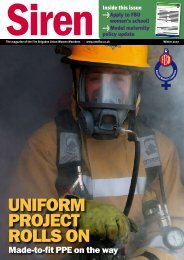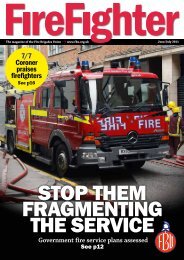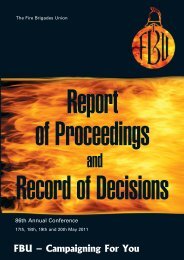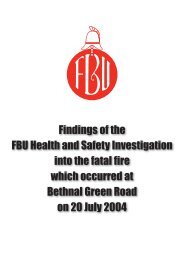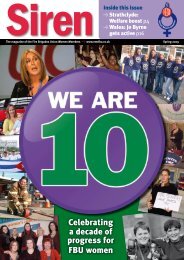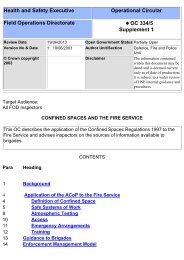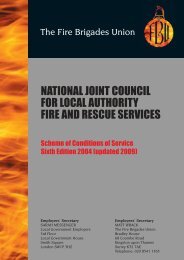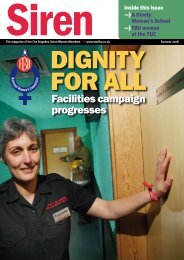Report - Fire Brigades Union
Report - Fire Brigades Union
Report - Fire Brigades Union
Create successful ePaper yourself
Turn your PDF publications into a flip-book with our unique Google optimized e-Paper software.
SECTION A — NATIONAL JOINT COUNCIL<br />
SCHEME OF CONDITIONS OF SERVICE<br />
SIXTH EDITION 2004<br />
PART D – MATERNITY, CHILDCARE AND DEPENDENCY<br />
Maternity provisions<br />
1. As equal opportunities employers, fire and rescue<br />
authorities acknowledge that more and more women are<br />
coping with the responsibilities of work and home. To this<br />
end fire and rescue authorities are committed to creating a<br />
positive working environment in which all employees are<br />
respected, provided with progression opportunities and can<br />
make the most of their abilities within a team.<br />
2. Pregnant employees should expect to be treated in a way<br />
that is sensitive to their circumstances and should not in<br />
any way be singled out for inferior treatment. Pregnancy<br />
should be regarded as part of everyday life and any health<br />
and safety implications can be adequately addressed by<br />
the usual procedures for the management of health and<br />
safety.<br />
3. Nothing in the following provisions, which are minima that<br />
may be enhanced locally, should be construed as providing<br />
anything less favourable than statutory rights.<br />
Obligations on the employer<br />
4. <strong>Fire</strong> and rescue authorities should have in place policies<br />
that reflect these provisions and any local enhancements.<br />
Copies of such policies should be openly available to<br />
employees.<br />
5. Pregnant women and new mothers have a statutory<br />
entitlement not to be exposed to risks that could harm<br />
either themselves or their unborn child. <strong>Fire</strong> and rescue<br />
authorities are reminded that:<br />
(1) The Workplace (Health, Safety and Welfare)<br />
Regulations 1992 require employers to provide suitable<br />
rest facilities for pregnant women and nursing<br />
mothers. This is expanded upon in the Health and<br />
Safety Executive guidance New and Expectant<br />
Mothers at Work: A Guide for Employers.<br />
(2) The Management of Health and Safety at Work<br />
Regulations 1999 require employers to carry out a risk<br />
assessment in respect of new or expectant mothers.<br />
Temporary adjustments in working arrangements may<br />
be required as a result.<br />
6. <strong>Fire</strong> and rescue authorities are advised that, when<br />
pregnancy is suspected, medical advice should be sought<br />
immediately as to whether the employee can continue to<br />
perform her current duties. If a point is reached where her<br />
doctor advises her that she can no longer perform her<br />
current duties, or work her current pattern of hours, the<br />
employee should be consulted immediately over<br />
appropriate changes. In either case she shall continue to<br />
receive her normal pay (for employees on the retained duty<br />
system this shall be calculated in accordance with<br />
paragraph 36 below). Similarly, on her return to work<br />
following the birth and maternity leave, there may be a<br />
period during which a change in duties or pattern of<br />
working hours would be appropriate, again depending on<br />
medical advice, in which case the employee’s normal pay<br />
would continue to apply.<br />
7. Pregnant employees will normally remain on their watch,<br />
or in their department, unless this is deemed inappropriate<br />
following an individual risk assessment.<br />
8. On receipt of the employee’s notification of the intended<br />
date of commencement of maternity leave, the fire and<br />
rescue authority shall, within twenty-eight days, inform the<br />
employee of the day on which the maternity leave period<br />
will cease and of the date of return to work.<br />
9. Contractual benefits such as mobile phones where<br />
personal use is permitted and car allowances that are paid<br />
under the scheme of conditions of service will continue<br />
during maternity leave.<br />
Obligations on the employee<br />
10. In order to maximise the effectiveness of health protection<br />
through an individual risk assessment an employee should<br />
notify the fire and rescue authority as soon as possible<br />
after she becomes aware of her pregnancy. In any event,<br />
an employee shall notify the fire and rescue authority at<br />
least twenty-one days before her absence begins or as<br />
soon as is reasonably practicable:<br />
(1) That she is pregnant and the expected week of<br />
childbirth (EWC). The fire and rescue authority may ask<br />
the employee to produce a certificate from a registered<br />
medical practitioner or a certified midwife stating the<br />
EWC.<br />
(2) The date that her absence will commence, in writing if<br />
requested by the fire and rescue authority.<br />
(3) That she intends to return to work, if that is the case.<br />
The authority may ask for this to be confirmed in<br />
writing. (This provision applies only to employees who<br />
qualify under paragraph 19 below).<br />
11. As the pregnancy develops the employee should inform<br />
the fire and rescue authority, in writing if required, of any<br />
advice or recommendations received from her doctor. This<br />
may include advice that should be considered as part of<br />
the individual’s risk assessment, such as night work being<br />
inadvisable for health and safety reasons.<br />
Ante-natal care<br />
12. Pregnant employees are entitled to paid time off to attend<br />
for ante-natal care, including relaxation and parentcraft<br />
classes. The fire and rescue authority may request<br />
evidence of appointments.<br />
13. <strong>Fire</strong> and rescue authorities may wish to give sympathetic<br />
consideration, subject to the exigencies of the service, to<br />
reasonable time off for partners to attend ante-natal,<br />
relaxation and parentcraft classes.<br />
Maternity leave<br />
14. All employees shall be entitled to twenty-six weeks’<br />
ordinary maternity leave and twenty-six weeks’ additional<br />
maternity leave, providing a right to one year’s maternity<br />
leave in total, (the maternity leave period).<br />
15. Maternity leave shall commence no earlier than eleven<br />
weeks before the EWC. Where maternity leave has not<br />
commenced by the time of the birth it shall start on the<br />
day following the birth.<br />
22 FBU Annual <strong>Report</strong> 2011





